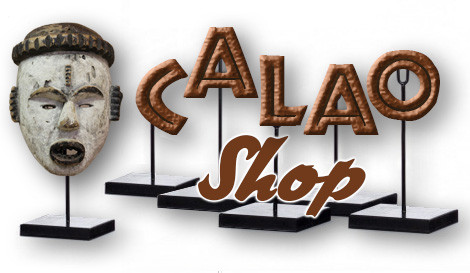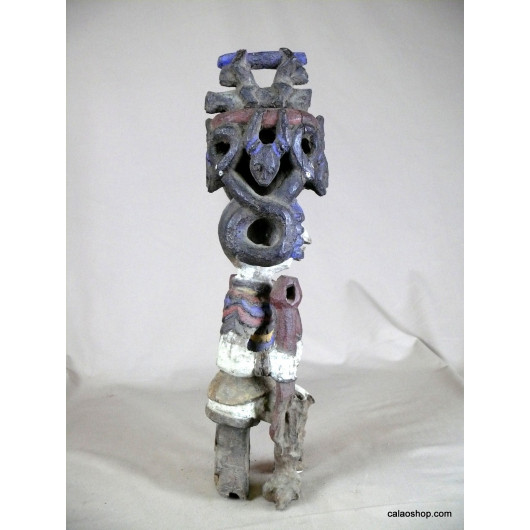Statue of Igbo
Ikenga is a personal god of human activity, who is called upon to obtain success, achievement and victory.
-
 Secured payment
Secured payment
-
 Free shipping from 150 €
Free shipping from 150 €
-
 Guarantee "satisfied or refunded"
Guarantee "satisfied or refunded"
Superb old African Ikenga statue, made of wood, kaolin and pigments, which comes from the Igbo ethnic group of Nigeria
Height: 53 cm, age cracks, missing parts, unstable (damaged left foot)
The Ikenga Igbo
The Ikenga is kept or owned by men, but also by women, of high reputation and who have demonstrated their great integrity.
He is a personal god of human activity, who is called upon to obtain success, achievement and victory. The Ikenga is based on the belief that the power of a man to accomplish important things is located in his right hand
The Ikenga requires to be consecrated before it can be used. The consecration is carried out in the presence of the parents by a head of the lineage. On this occasion, he receives offerings such as yam, wine, kola nut and alligator pepper or sacrifices, such as a rooster.
When the owner has been consecrated, he places his Ikenga on a personal or family altar, away from profane eyes and feeds it daily with kola nuts and wine; periodically, especially before undertaking an important action, he offers the sacrificial blood of a rooster to ask the spirit to help him succeed in his enterprise. Once the action is completed, the owner gives thanks to his Ikenga
The Ikenga Warrior
There are different types of Ikenga, the most famous of which (like the one shown here) is the warrior represented by a human figure with a very developed headdress, sitting on a stool and holding a knife (symbolized) in his right hand and a tusk or, sometimes, a human head in his left hand. The Ikenga of the warrior corresponds to an age of life when men are required to demonstrate their military prowess and depicts the ideal young man: robust, dressed in the skirt of the warrior, and holding a knife and a severed human head…
Mythology of Ikenga
According to legend, Ikenga, son of Ngwu and the first man in the living memory of the Igbo, was a daring warrior and a fantastic wrestler who had the reputation of knowing how to fly from one tree to another…
The Igbo people
A people of farmers, mainly cultivating yams, the Igbo are one of the three major ethnic groups in Nigeria with the Hausa and the Yoruba; clashes with these two ethnic groups led them to try to regain their independence in 1967, by creating Biafra, with the consequences that we remember: massacres, famines... Biafra was reintegrated into Nigeria in 1970.
The Igbo are said to number just under thirty million and represent 15 to 20% of the Nigerian population; they are settled in the southeast of the country, north of the Niger Delta, in a region covered with forests and marshes.
In the past, the Igbo lived in small independent communities (villages), governed by a council of elders whose power was counterbalanced by secret societies. Today, they are mostly Catholic even if the traditional religion - Odinani - remains very present.










